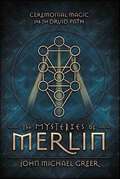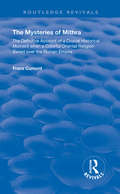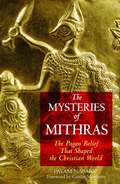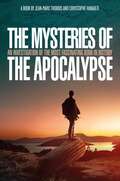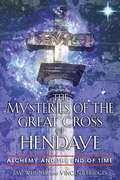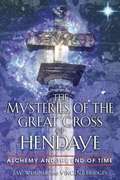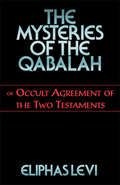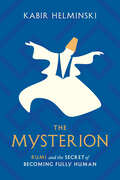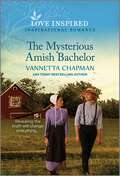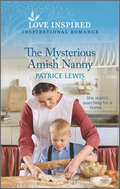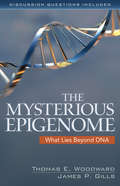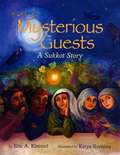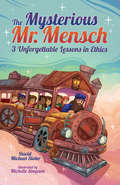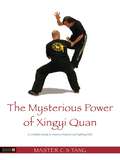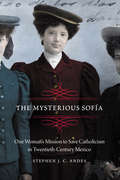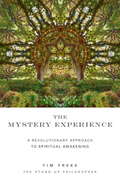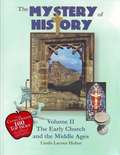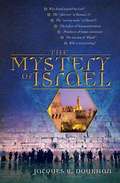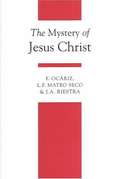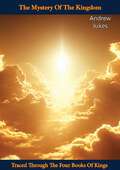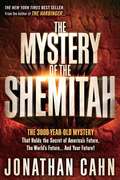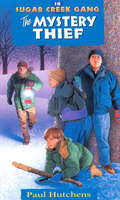- Table View
- List View
The Mysteries of Merlin: Ceremonial Magic for the Druid Path
by John Michael GreerDiscover Your Path of Self-Initiation through the Union of Druidry & Ceremonial MagicThis innovative system of self-initiation into ceremonial magic provides you with powerful rituals based on the life stages of the great wizard Merlin. Featuring eight full ceremonial workings to perform throughout the year for each of the three degrees, this exceptional guide deepens your spirituality and connects you to mysteries passed down across the ages.Join John Michael Greer as he presents a wealth of information on Merlin's life and legends. Explore ancient initiations and how they're connected to Celtic deities. Even if you have no experience with Druid magic, Greer's detailed instructions, meditations, and exercises make it easy to start your journey or enhance your spiritual path in exciting ways. By marrying Golden Dawn magic with Celtic Paganism, this impressive work unlocks vital wisdom for your modern practice.
The Mysteries of Mithra: The Definitive Account of a Crucial Historical Moment when a Colorful Oriental Religion Swept over the Roman Empire (Routledge Revivals)
by Franz CumontFirst published in 1956, this seminal study, by the great Belgian scholar Franz Cumont, remains the definitive coverage of a great ideological struggle between the West and the Orient in the first centuries of the Christian era. Mithraism, a mystery religion originating in Persia, spread rapidly through the Roman Empire, and achieved such strength that Europe almost became Mithraic. Dr. Cumont, the world’s’ greatest authority on aspects of classical religions, here discusses the origins of this colourful oriental religion, and its association with the Roman army. Then utilizing fragmentary monuments and texts, in one of the greatest feats of scholarly detection, he reconstructs the mystery teachings and secret doctrines, the hidden organization and cult of Mithra. This volume includes 70 illustrations.
The Mysteries of Mithras: The Pagan Belief That Shaped the Christian World
by Caitlín Matthews Payam NabarzAn overview of Mithraism, the ancient Roman mystery religion popular in the Roman Legions• Provides a comprehensive history of Mithraism, including its influence on Christianity and Islam• Includes rituals, meditations, and teaching tales for readers who wish to follow the Mithraic path• Studies the evolution and divergence of the Eastern (Persian) and Western (Roman) forms of MithraismThe Mysteries of Mithras presents a revival of the magical practices and initiatory system of Mithraism, the ancient Roman mystery religion that was immensely popular in the Roman Legions from the late second century B.C. until A.D. 400 and was taken to every corner of the Roman Empire. As the last pagan state religion in Europe, it was the most important competitor to early Christianity and heavily influenced Christian doctrine and symbolism. The parallels between Christianity and ancient Mithraism are striking--for example, the god Mithra was born of a virgin in a cave on December 25.Payam Nabarz reveals the history, origins, and spiritual and philosophical tenets of Mithraism and its connections to Christianity, Islam, and Freemasonry. He also describes the modern neo-pagan practice of Mithraism in evidence today and for readers who wish to adopt the Mithraic path, he includes seven of its initiatory rituals and meditations, as well as orations and teaching tales, that open the door to the seven Mithraic grades of passage.
The Mysteries of the Apocalypse: An Investigation into the Most Fascinating Book in History
by Christophe Hanauer Jean-Marc Thobois (1944 - 2020)Inspired by the complimentary feature film documentary series, The 7 Churches of Revelation, The Mysteries of the Apocalypse by Jean-Marc Thobois and Christophe Hanauer looks at the book of Revelation through the lens of biblical history, archaeology, and culture, giving readers a more accurate—and fascinating—understanding of the end times. The book of Revelation, written by the Apostle John, opens with a set of seven letters sent to a community of seven churches located in present-day Turkey. The term apocalypse has acquired a negative connotation over the centuries that has taken it away from its original meaning to evoke a cataclysmic and destructive event. This word has become popular for the wrong reasons. In Ancient Greek, it means a disclosure or revelation of great knowledge. The first key to better understand the mysteries of the prophecies of Revelation is to refer to Old Testament scriptures. In order to understand the New Testament, one should ask how the people of Israel understood and interpreted the teachings of Jesus and the apostles in their day. The second key is to consider the historical and political context of the time of writing of the text. In the first century, the Roman Empire persecuted, sometimes with extreme violence, the followers of Jesus Christ. Finally, the third key proposed is to regard the book of Revelation as a sort of synthesis, a summary of eschatological prophecies present throughout the Bible. Far from claiming to provide absolute truth, these three major keys help to decipher the true meaning of the text and better grasp its allusions and other symbolisms. Thus history, archeology, and culture anchor the book in reality. This unveiling gives context that speaks with great interest to our generation.
The Mysteries of the Great Cross of Hendaye: Alchemy and the End of Time
by Jay Weidner Vincent BridgesDecodes the message inscribed on the Great Cross of Hendaye in France• Uses the work of 20th-century alchemist Fulcanelli to predict the date of the fatal season of the apocalypse• Shows how periodic galactic alignments may cause catastrophes on Earth• Examines how the secret of the center of the galaxy reveals the true location of the lost civilization of Atlantis• Reveals the alchemical secret of the imperishable Light Body of ancient Egypt deep within our DNAThe Mysteries of the Great Cross of Hendaye reveals one of Western occultism's deepest secrets: The alchemical transformation of base metal into gold is also the transformation of the current Iron Age into the Golden Age. Based on the work of the enigmatic 20th-century alchemist Fulcanelli, authors Weidner and Bridges show how the greatest alchemical secret is that of time itself and that coded into an obscure monument in southwestern France--the cross in the town square of Hendaye--is the imminent date of the apocalypse. The authors' explorations of this symbolism lead them from the cross of Hendaye to the western facade of the cathedral of Notre Dame in Paris, the Pyrenees, ancient Egypt, and the secret origins of Atlantis in Peru, to reveal that we are indeed living in a "fatal season" and that this season is intimately connected to our solar system's alignment with the galactic center. The authors' in-depth examination of alchemy's connection with the coming end days also reveals that this astro-alchemical knowledge was part of the sacred science of the Egyptians and the Atlanteans, whose coded messages are, at last, deciphered to guide humanity to its future destiny.
The Mysteries of the Great Cross of Hendeye: Alchemy and the End of Time
by Jay Weidner Vincent BridgesAn exploration of world religions from Egypt to the present and how the theme of alchemy is woven throughout. This is a 2nd edition of their work with 200 additional pages
The Mysteries of the Qabalah: or Occult Agreement of the Two Testaments
by Eliphas LeviLévi links the Old and New Testaments by comparing the qabalistic imagery and concepts inherent in both "The Prophecy of Ezekiel" and "The Apocalypse of St. John." Includes Lévi's illuminating commentary on Ezekiel. He explains how the description of Solomon's temple, the great sanctuary of the true God, represents the Qabalistic or traditional theology of the Hebrew seven the measurements are symbolic and refer to sacred numbers.
The Mysterion: Rumi and the Secret of Becoming Fully Human
by Kabir HelminskiA contemporary exploration into the meaning and possibility of our human existence, through the universal insights of the 13th-century Persian poet and Sufi mystic Rumi—by pre-eminent Rumi translator, Kabir Helminski.The 13th-century poet and mystic Rumi has become one of the most popular spiritual voices of our time—known and loved by people of many faiths and worldviews for his rich metaphors, images, poems, and stories. The Mysterion deepens our appreciation of his teachings by illuminating both the practical psychological dimension behind them, as well as the universal spiritual truths they offer about what it means to be human.In this philosophical survey, Kabir Helminski, one of the foremost translators and writers of Sufi texts, gives us a contemporary lens through which to view and understand the &“Mysterion,&” the unifying concept that bridges the human and the divine—and that connects the individual soul with spiritual Reality. This book is centered on that core, unifying concept of the Mysterion: the essence and intrinsic meaning of being human. Rumi, says Helminski, would suggest that in our human existence we might accomplish many marvels, but they will amount to little if we neglect cultivating the divine potential within us. Like a mirror, he says, we can reflect a spectrum of divine qualities depending on how polished and clean our mirror is. Likewise, our mirrors can become distorted and corroded by egoism and negativity. Our practical work, says Helminski (and Rumi), is to remove distortions from our souls and align ourselves with this higher order reality and divine agency, through humility, reverence, surrender, and love.
The Mysterious Amish Bachelor: An Uplifting Inspirational Romance (Indiana Amish Market #4)
by Vannetta ChapmanHe has a secret. She&’s set on discovering it. After paying the price for a crime he committed ten years ago, Noah Beiler wants a fresh start—which means hiding where he&’s been for the last decade from his Amish community. But Sarah Yoder is determined to uncover his past. As Noah and Sarah work together and grow close, Noah&’s history is the only thing standing in their way. Will revealing the truth set them free, or are some secrets best kept buried?From Love Inspired: Uplifting stories of faith, forgiveness and hope.Indiana Amish Market Book 1: An Amish Proposal for ChristmasBook 2: Her Amish AdversaryBook 3: An Unusual Amish Winter MatchBook 4: The Mysterious Amish Bachelor
The Mysterious Amish Nanny: An Uplifting Inspirational Romance
by Patrice LewisAn Amish widower’s new nanny hides a shameful secret in this inspirational romance.When car failure stalls Englischer Ruth Wengerd’s impulsive cross-country trip, she doesn’t expect to be rescued by a horse and buggy—or to suddenly become a nanny for widower Adam Chupp’s son. Helping the sweet family reminds Ruth of her Amish upbringing and the shameful secret she’s hiding. But when the temporary job begins to feel permanent, can she face up to her past . . . for a future she left once before?From Love Inspired: Uplifting stories of faith, forgiveness and hope.
The Mysterious Epigenome: What Lies Beyond DNA
by Thomas E. Woodward James P. GillsIn this creative and inventive book, authors Thomas E. Woodward and James P. Gills take readers on an exploration of the human epigenome. Acting as tour guides leading visitors through a 3-D model of a human cell, Woodward and Gills bring to life the human molecular makeup. Readers (as visitors) will get up close and personal with the minute details of human molecular structure, including E. coli, flagellum, a DNA helix, an RNA molecule, and more. By seeing it with their own eyes, readers will gain a better understanding of their genetic systems and a better appreciation for the Creator who put this all into place.
The Mysterious Guests: A Sukkot Story
by Eric A. KimmelThree mysterious guests appear at generous but impoverished Ezra's table on Sukkot and bless him, while they bring curses upon his rich but selfish brother Eben. Other books by this author are available in this library.
The Mysterious Hideaway (Adventures of the Northwoods #6)
by Lois Walfrid JohnsonJohnson's series has shown turn-of-the-century northern Wisconsin to be a captivating setting for young readers. As the spring terms at Spirit Lake School begins, Kate hears a strange noise that is followed by even stranger happenings around the school.
The Mysterious Mr. Mensch: 3 Unforgettable Lessons in Ethics
by David Michael SlaterFrom the best-selling author of Mysterious Monsters, comes The Mysterious Mr. Mensch, an early chapter book series full of magic, adventure, and learning opportunities for young readers of all backgrounds. In each story, Mr. Mensch will instill in kids, in the most memorable and exciting ways, possible, positive values and important life lessons. You've heard of the Magic School Bus, where kids learn science. Now, we help them learn about ethics aboard The Magical Meshugenahmobile!
The Mysterious Power of Xingyi Quan: A Complete Guide to History, Weapons and Fighting Skills
by C S TangThe ancient Chinese martial art of Xingyi Quan is known for its explosive internal power. Closely related to both Taiji Quan and Bagua Quan, Xingyi is regarded as the most esoteric, and the most dangerous of the fighting arts, though the purposes of consistent practice include health and spiritual development. This in-depth guide is the first to cover the history and traditions of the art in such a comprehensive way, describing the essential Xingyi Quan movements, and their effects, in fully illustrated form, and including the author's research with the Song Xingyi Quan clan in China. The book contains a comprehensive teaching guide to the practice of Santi Shr and the Five Element Fists, the core exercises of this potent fighting system, as well as explanations of the underlying principles which give Xingyi Masters their great depth of skill and refined understanding of combat strategy. The reader will also find clearly illustrated teachings of all the Twelve Animal Forms, linking forms, two person sets, basic skills, and the weapons training. This authoritative book will be an illuminating and complete guide for anyone interested in the internal martial arts, especially those practicing or teaching Xingyi Quan or wanting to learn more about it.
The Mysterious Sofía: One Woman's Mission to Save Catholicism in Twentieth-Century Mexico (The Mexican Experience)
by Stephen J. AndesWho was the &“Mysterious Sofía,&” whose letter in November 1934 was sent from Washington DC to Mexico City and intercepted by the Mexican Secret Service? In The Mysterious Sofía Stephen J. C. Andes uses the remarkable story of Sofía del Valle to tell the history of Catholicism&’s global shift from north to south and the importance of women to Catholic survival and change over the course of the twentieth century. As a devout Catholic single woman, neither nun nor mother, del Valle resisted religious persecution in an era of Mexican revolutionary upheaval, became a labor activist in a time of class conflict, founded an educational movement, toured the United States as a public lecturer, and raised money for Catholic ministries—all in an age dominated by economic depression, gender prejudice, and racial discrimination. The rise of the Global South marked a new power dynamic within the Church as Latin America moved from the margins of activism to the vanguard. Del Valle&’s life and the stories of those she met along the way illustrate the shared pious practices, gender norms, and organizational networks that linked activists across national borders. Told through the eyes of a little-known laywoman from Mexico, Andes shows how women journeyed from the pews into the heart of the modern world.
The Mysterious World of Cats: The ultimate gift book for people who are bonkers about their cat
by Herbie Brennan'In ancient times cats were worshipped a gods; they have not forgotten this.' Terry PratchettHerbie Brennan is a New York Times bestselling author on the occult who has sold over ten million books world-wide - including in France, Germany and Italy. Here he writes a delightful short but definitive guide to cat lore, weaving together myth, magic, anecdote, fascinating, amusing factoids and even scientific research, complete with beautiful line drawings - from the Egyptian cat goddess Bastet to Macavity the Mystery Cat. Here at last is the book that proves to you that everything you suspected about your cat's uncanny powers of intuition, hypnosis, mind-reading, bi-location and levitation are in fact all true!
The Mysterious World of Cats: The ultimate gift book for people who are bonkers about their cat
by Herbie Brennan'In ancient times cats were worshipped a gods; they have not forgotten this.' Terry PratchettHerbie Brennan is a New York Times bestselling author on the occult who has sold over ten million books world-wide - including in France, Germany and Italy. Here he writes a delightful short but definitive guide to cat lore, weaving together myth, magic, anecdote, fascinating, amusing factoids and even scientific research, complete with beautiful line drawings - from the Egyptian cat goddess Bastet to Macavity the Mystery Cat. Here at last is the book that proves to you that everything you suspected about your cat's uncanny powers of intuition, hypnosis, mind-reading, bi-location and levitation are in fact all true!
The Mystery Experience
by Tim FrekePrepare for the journey of your life. Literally. This book does not aim to make your life carefree, to make your problems disappear, to turn you into a saint free from blemish or blame. In fact, you may end up utterly bewildered by The Mystery Experience at times. But you will also be intrigued. Curious.Questioning. Loving. Loved. Overjoyed. Seduced out of the numbness of banality. And most importantly, awake. Gloriously awake, and full of wonder. Philosopher and author Tim Freke leads us on a journey through the nature of the 'Mystery Experience', via quantum physics, Gnosticism, the essence of Tao, meditation, Walt Whitman, Greek mythology, Buddhism, Dub Punk musician Jah Wobble, and Carl Jung. But what is the 'Mystery Experience'? You can taste it by simply focusing your attention on the mystery. But what is the mystery? The mystery is life. The mystery is the journey. The mystery is you. The mystery is me. The mystery makes you want to say, simply: WOW. No one has the answers, but asking the questions is what makes us come alive. Wherever you're coming from, you will find this journey rewarding. The only real requirement is that you're willing to wonder about life - to be curious and open - to be an explorer. Now prepare to leave base camp, because we're about to set off on a grand adventure.
The Mystery Of History: The Early Church And The Middle Ages
by Linda Lacour HobarOne of Cathy Duffy's 100 Top Picks for Homeschool Curriculum The Mystery of History provides a historically accurate, Bible-centered approach to learning ancient history. The completely chronological lessons shed new light on who walked the earth when, as well as on where important Bible figures fit into secular history. Volume 2 covers the Early Church to the Middle Ages. This unique history curriculum was written for 4th-8th graders, but it is adaptable for both older and younger students.
The Mystery Of Israel
by Jacques B. DoukhanDoukhan shows how careless interpretations of Scripture can spawn anti-Semitism and examines some of the traditional theories of the relationship between God and the Jews and between the Jews and Christianity.
The Mystery Of Jesus Christ
by Fernando Ocariz L. F. Mateo-Seco J. A. RiestraWritten chiefly for theology students the book presents the authentic teachings of Catholic faith, to be found not only in the ancient conciliar sources, but also in important recent documents dealing with disputed issues of our times. Chapters deal with: The hoped-for Saviour; The Coming of Jesus Christ in the fullness of time; The Person of Christ; Christ, the Way, the Truth and the Life; Redemption.
The Mystery Of The Kingdom: Traced Through The Four Books Of Kings (1884)
by Andrew Jukes"The Mystery of the Kingdom: Traced Through the Four Books of Kings" by Andrew Jukes offers a profound and insightful exploration into the spiritual significance and deeper meanings of the biblical Books of Kings. Jukes, a renowned theologian and biblical scholar, guides readers through a meticulous analysis of these ancient texts, uncovering the divine mysteries and theological lessons embedded within the historical narratives.In this compelling work, Jukes traces the unfolding of God's kingdom as revealed through the reigns of Israel's and Judah's kings. He delves into the lives, actions, and decisions of these monarchs, highlighting how their stories reflect broader spiritual truths and the overarching plan of God for His people. The book provides a detailed examination of key events, such as the division of the kingdom, the rise and fall of dynasties, and the prophetic messages delivered by God's chosen messengers.Jukes' interpretation goes beyond mere historical recounting, offering readers a deeper understanding of the symbolic and prophetic dimensions of the Books of Kings. He draws connections between the ancient texts and the spiritual journey of believers, illustrating how the successes and failures of the kings serve as lessons for faith, obedience, and the pursuit of God's will."The Mystery of the Kingdom" is enriched by Jukes' eloquent writing and his ability to illuminate complex theological concepts with clarity and depth. His insights encourage readers to reflect on the nature of God's kingdom, the role of leadership, and the importance of fidelity to divine principles.This book is a valuable resource for theologians, biblical scholars, and anyone seeking to deepen their understanding of the Bible's historical books. "The Mystery of the Kingdom: Traced Through the Four Books of Kings" offers a thought-provoking journey into the heart of biblical history, revealing the timeless truths that continue to inspire and guide the faithful today.
The Mystery Of The Shemitah: The 3,000-year-old Mystery That Holds The Secret Of America's Future, The World's Future, And Your Future!
by Jonathan CahnThe book you can't afford NOT to read. It is already affecting your life. And it WILL affect your future! Is it possible that there exists a three-thousand-year-old mystery that. Has been determining the course of your life without your knowing it? · Foretells current events before they happen? · Revealed the dates and the hours of the greatest crashes in Wall Street history before they happened? · Determined the timing of 9/11? · Lies behind the rise of America to global superpower. . . and its fall? · Has forecast the rising and falling of the world's stock market throughout modern times? · Lies behind world wars and the collapse of nations, world powers, and empires? · Holds key to what lies ahead for the world and for your life? · And much more. . . .
The Mystery Thief (Sugar Creek Gang Original Series #10)
by Paul HutchensThe tales and travels of the Sugar Creek Gang have passed the test of time, delighting young readers for more than fifty years. Great mysteries with a message, The Sugar Creek Gang series chronicles the faith-building adventures of a group of fun-loving, courageous Christian boys. Your kids will be thrilled, chilled, and inspired to grow as they follow the legendary escapades of Bill Collins, Dragonfly, and the rest of the gang and see how they struggle with the application of their Christian faith to the adventure of life. Someone knocks Bill Collins into a snowdrift and steals his suitcase when he goes to spend the night with Poetry. When the boys track the footprints in the snow, they make an amazing discovery. A penmanship test helps to solve the mystery about the mean notes received by Bill and Mr. Black. Find out with the gang how important it is to love and befriend those who hurt us.
